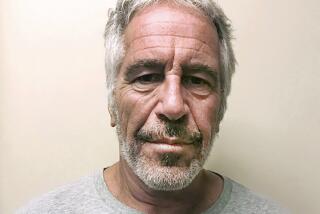Company That Set Up Offshore Banks to Fold : Finance: Jerome N. Schneider, the biggest promoter of the controversial institutions, is closing Beverly Hills-based WFI. Regulations are tighter now.
- Share via
Jerome N. Schneider, the nation’s biggest and most controversial offshore bank promoter, said Tuesday that he is getting out of the business, in part because foreign governments have tightened their banking regulations in the wake of the Bank of Credit & Commerce International scandal.
Schneider said WFI, the Beverly Hills company he heads, will be liquidated by the end of the month. Schneider, who set up about 800 offshore banks in 15 years, plans to go into the securities business under the name Robertson Securities.
Schneider and WFI have been thorns in the side of federal banking authorities and the Internal Revenue Service for years.
Banking authorities have long complained that WFI operated in a “gray area” of the law, setting up for clients offshore “banks” on paper, often for tax or privacy reasons, in exotic locales where banking regulation is loose. The areas include Montserrat in the Caribbean and the Marshall Islands in the Pacific. Frequently, the names of the banks are similar to those of well-known domestic banks, with “Chase,” “Morgan” and similar words in their titles.
What concerns authorities most is that offshore banks are often purchased for money laundering, investment scams, tax evasion and other illegal activities. Schneider’s most famous client is La Jolla scam artist J. David Dominelli, who is serving a 20-year prison sentence for bilking investors out of $80 million. Schneider, who maintains that he was fooled by Dominelli, established J. David Banking for him on Montserrat.
“A lot of the licenses we saw that were questionable happened to originate through his companies,” said Robert B. Serino, deputy chief counsel with the U.S. office of the comptroller of the currency. “We are happy there is one less person arranging charters for what look like ‘suitcase’ banks.”
Schneider argued that he had no control over what clients did with the banks and that only about one bank a year that he set up turned out to be a problem. Despite years of public criticism by federal authorities, no charges have been brought against Schneider or WFI.
Schneider said federal authorities undoubtedly are happy that he is leaving the business, although one of his senior vice presidents, Pat Kish, will form an offshore bank consulting firm.
“I think the IRS will be very happy to know this,” he said. “I think the comptroller of the currency will be very happy to know. We were a tick.”
Authorities offshore have stepped up banking supervision in the wake of the July crackdown by bank officials worldwide on BCCI. The Abu Dhabi-controlled bank is accused of defrauding investors, falsifying records and other criminal activity in the biggest international banking scandal ever.
Montserrat, a favorite of offshore bank promoters, has tightened its supervision. On top of the fallout from the BCCI scandal, Schneider said, the closing of numerous tax loopholes in 1986 that once made offshore banks attractive continues to hurt the offshore banking business.
“I just think the opportunities are not as fruitful as they have been,” he said.
Schneider confirmed that WFI’s business has slowed considerably, adding that the 50 or so banks the firm set up this year are about half the number it set up in 1990. He said WFI was forced to lay off four of its 20 employees recently, but he added that the company will be able to pay its creditors in full.
More to Read
Inside the business of entertainment
The Wide Shot brings you news, analysis and insights on everything from streaming wars to production — and what it all means for the future.
You may occasionally receive promotional content from the Los Angeles Times.









